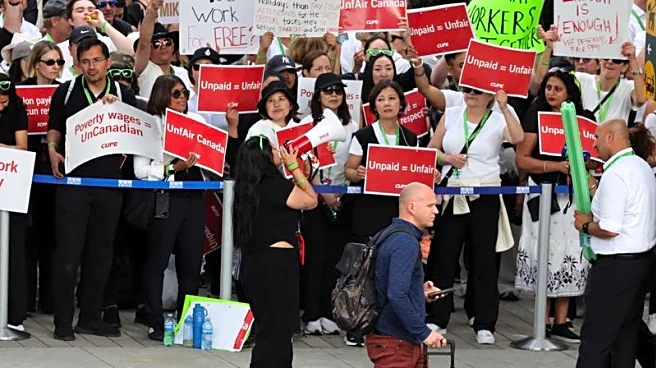By Allison Lampert and Rajesh Kumar Singh
MONTREAL/CHICAGO (Reuters) -A crippling strike by Air Canada flight attendants that grounded thousands of flights over wages and unpaid labor is the latest blow
to the airline industry's compensation system that does not fully pay cabin crews for their hours at work.
The union, representing more than 10,000 Air Canada flight attendants, said on Tuesday they reached a tentative deal that ends unpaid work, without sharing further details. Analysts say any gains could influence upcoming contract negotiations in North America.
The deal could also drive up structural costs in a cyclical industry. Labor is airlines' biggest operating expense after fuel.
The four-day strike that stranded more than 500,000 passengers mirrors unrest at U.S. carriers, where flight attendants cannot walk off the job until the National Mediation Board grants permission. But cabin crews at American, Southwest, and Alaska Airlines last year rejected several contract deals, saying they did not address concerns about unpaid work.
Flight attendants at United Airlines last month voted down a $6-billion tentative labor agreement, which did not provide compensation for time on the ground before and after flights.
The Chicago-based airline's union is surveying its members before returning to bargaining in December. United and the union did not immediately respond to requests for comments.
While cabin crews get paid for a minimum number of hours, they are mostly compensated when planes are in motion, neglecting the crucial tasks performed during boarding, deplaning, and other ground operations.
Unions say this amounts to significant unpaid labor. In previous contract negotiations, airlines secured concessions from workers as the industry was struggling due to economic downturns or the pandemic.
But a runup in inflation, stagnant wages, and increased workload have fueled resentment among flight attendants, bolstering demands for a change in pay practices.
"The Air Canada strike helps negotiations everywhere. It defined the problem of ridiculous expectations for flight attendants to work without pay," said Sara Nelson, international president of the Association of Flight Attendants-CWA, which represents 55,000 flight attendants at 20 airlines, including United.
"The striking flight attendants are an inspiration to working people everywhere."
Nelson spoke with Wesley Lesosky, head of Air Canada's flight attendants union, on Monday to coordinate positions, representatives of both unions told Reuters.
Shanyn Elliott, an Air Canada Rouge flight attendant, said when she started work in 2017, she would pick up long-haul flights to earn extra pay as her C$23 ($16.60) hourly wage did not cover the cost of living.
Adding to her frustration, frequent flight delays after the pandemic meant longer hours, said Elliott, who heads the strike committee for Air Canada flight attendants at the Canadian Union of Public Employees.
Air Canada CEO Michael Rousseau said the industry needed to review its compensation models. In an interview, he said the Canadian carrier has accepted the concept of ground pay, adding other airlines will likely look at their own models.
"I do think the industry has to take a closer look at this over time," Rousseau told Reuters. "We all should be open to change."
American and Alaska have already begun compensating attendants for boarding time in their new labor agreements. American's flight attendants are now also compensated for some hours between flights.
Those gains came after Delta Air Lines, whose flight attendants are not in a union, instituted boarding pay for cabin crew at half of their hourly wages in 2022 when they were trying to organize.
HIGHER COSTS
But paying for boarding and time on the ground would inflate airlines' operating costs.
American Airlines' new flight attendant contract is estimated to cost it an extra $4.2 billion over five years. The company last month blamed increased labor costs in part for its margin underperformance.
Canaccord Genuity analyst Matthew Lee estimates the proposed wage hikes at Air Canada would mean up to C$140 million in incremental costs. Air Canada's wage bill has increased about 26% since before the pandemic.
The airline is already grappling with weak passenger traffic to the U.S. amid strained trade relations between Canada and the U.S., leading to a nearly 40% year-on-year decline in quarterly profit.
But analysts warn holding the line on costs risks industrial peace. "The movement is on," said John Gradek, a faculty lecturer in supply networks and aviation management at McGill University.
($1 = 1.3855 Canadian dollars)
(Reporting by Rajesh Kumar SinghEditing by Rod Nickel)









